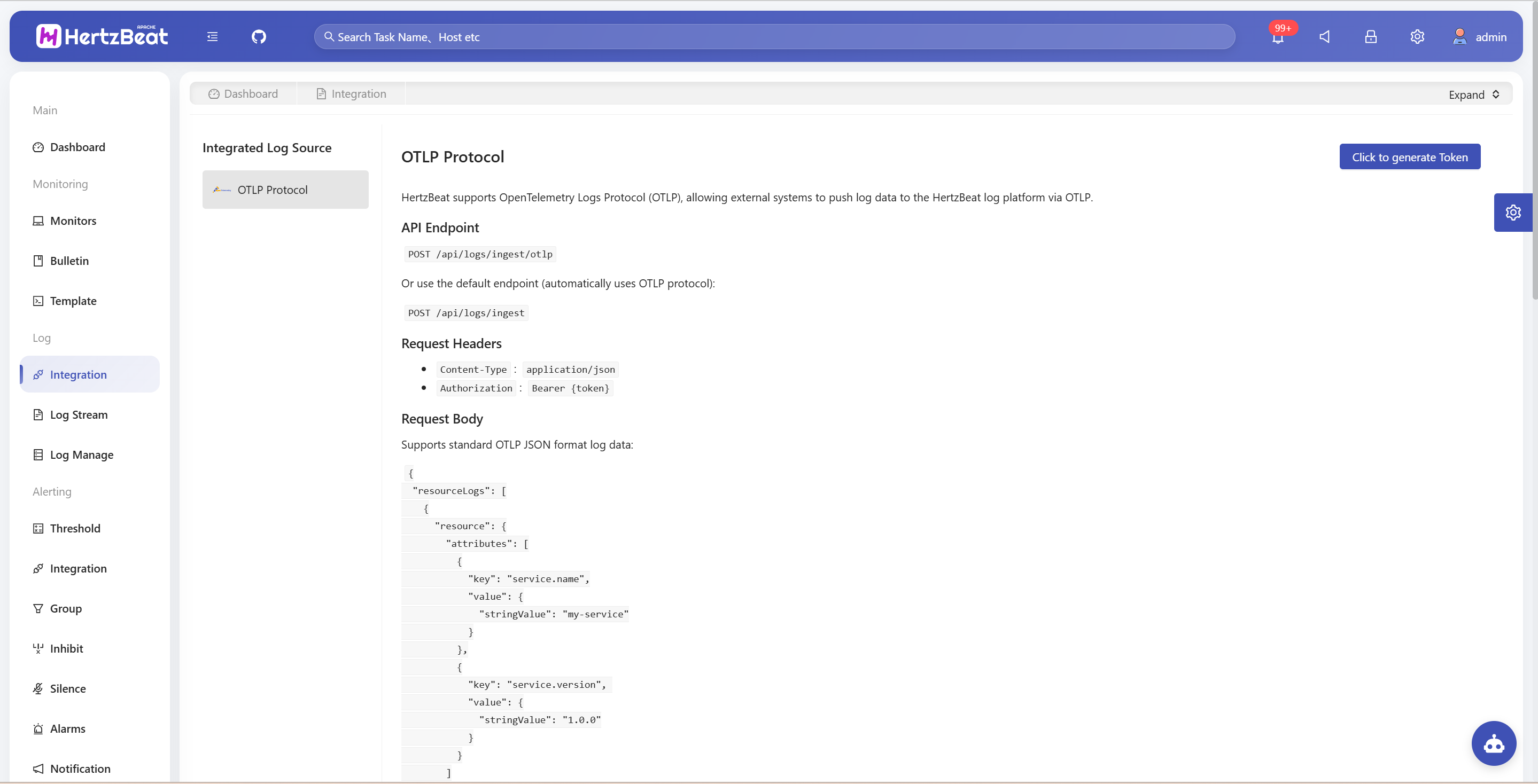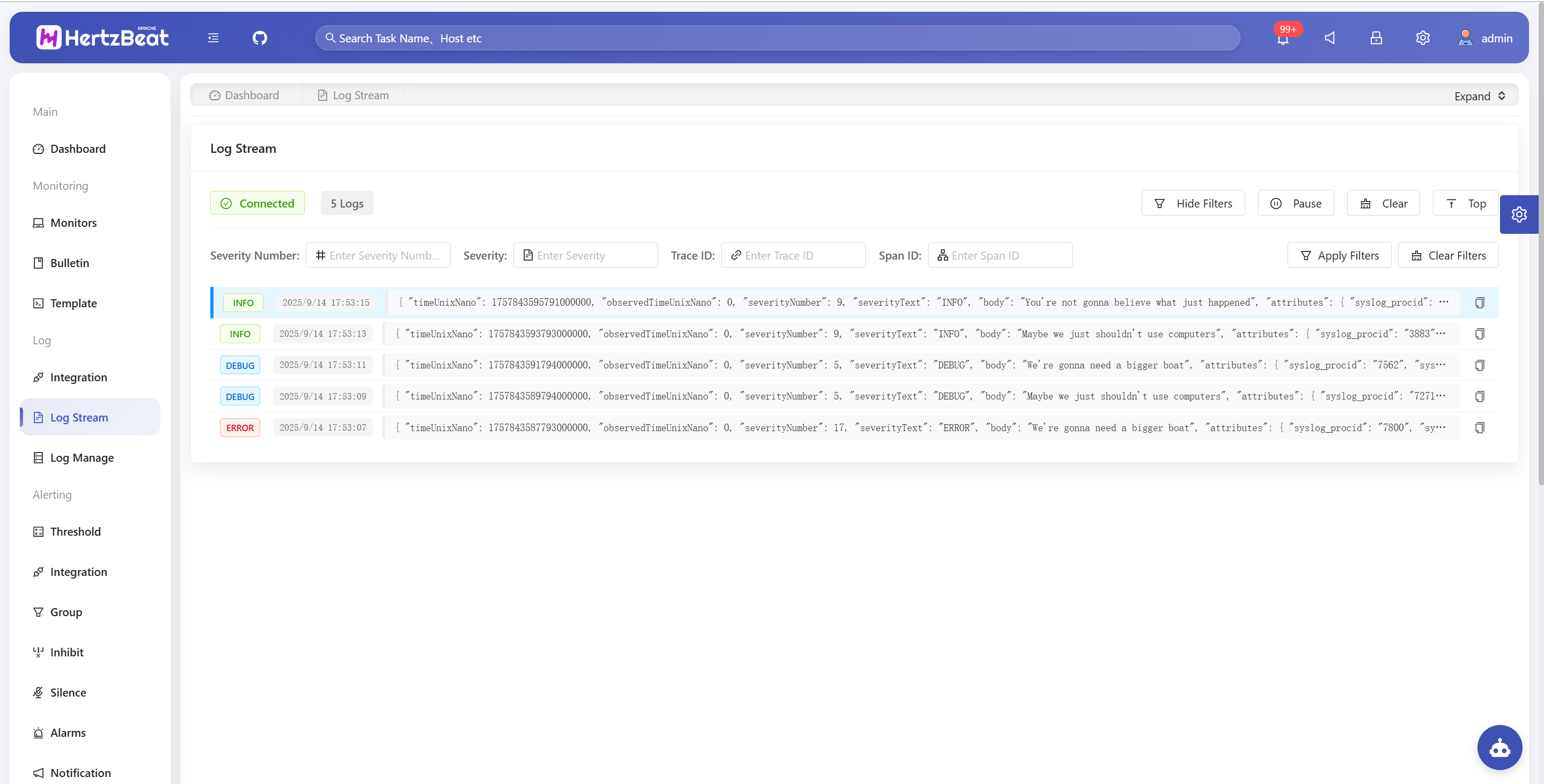Log Integration
HertzBeat's log integration module aims to achieve unified reception, standardized processing of log data from different third-party log systems and observability platforms. As a centralized "log center", HertzBeat can efficiently integrate log information from external systems and provide real-time log monitoring and analysis capabilities.
Core Capabilities
- Multi-source Log Integration: Support receiving log data from mainstream platforms such as OpenTelemetry, Filebeat, Vector, Loki
- Log Format Standardization: Convert log data from different platforms to HertzBeat's internal unified format for subsequent processing and analysis
- Real-time Log Processing: Provide real-time log stream processing capabilities, supporting instant storage and distribution of log data
- Intelligent Log Analysis: Provide log search, filtering and other analysis functions
Supported Log Sources
HertzBeat currently supports data integration from the following third-party log platforms:
- OTLP: Support standard OpenTelemetry Log Protocol (OTLP) HTTP/JSON format, can directly receive log data from OpenTelemetry Collector and various applications that support OTLP.
- More Protocol Support: HertzBeat is actively expanding its log integration support, including Filebeat, Vector, Loki, etc. If you can't find the integration you need temporarily, the active community can also help you add it.
You can view specific integration methods and configuration examples through HertzBeat's "Log Integration" interface.

OpenTelemetry OTLP Protocol Integration
API Endpoints
HertzBeat provides the following interfaces for receiving OTLP log data:
Protocol-specific Interface:
POST /api/logs/ingest/otlp
Default Interface (automatically uses OTLP protocol):
POST /api/logs/ingest
Request Configuration
Request Headers
Content-Type:application/jsonAuthorization:Bearer {token}
Request Body Format
Support standard OTLP JSON format log data:
{
"resourceLogs": [
{
"resource": {
"attributes": [
{
"key": "service.name",
"value": {
"stringValue": "my-service"
}
},
{
"key": "service.version",
"value": {
"stringValue": "1.0.0"
}
}
]
},
"scopeLogs": [
{
"scope": {
"name": "my-logger",
"version": "1.0.0"
},
"logRecords": [
{
"timeUnixNano": "1640995200000000000",
"severityNumber": 9,
"severityText": "INFO",
"body": {
"stringValue": "This is a log message"
},
"attributes": [
{
"key": "user.id",
"value": {
"stringValue": "12345"
}
}
],
"traceId": "12345678901234567890123456789012",
"spanId": "1234567890123456"
}
]
}
]
}
]
}
Configuration Examples
OpenTelemetry Collector Configuration
Add HertzBeat as a log export target in the OpenTelemetry Collector configuration file:
exporters:
otlphttp:
logs_endpoint: http://{hertzbeat_host}:1157/api/logs/ingest/otlp
compression: none
encoding: json
headers:
Authorization: "Bearer {token}"
service:
pipelines:
logs:
receivers: [otlp]
processors: [batch]
exporters: [otlphttp]
Log Data Format Description
Core Fields
- timeUnixNano: Log timestamp (nanosecond precision)
- severityNumber: Log level numeric value (1-24, corresponding to TRACE to FATAL)
- severityText: Log level text (such as "INFO", "ERROR", etc.)
- body: Log message content
- attributes: Log attribute key-value pairs
- traceId: Trace ID (optional)
- spanId: Span ID (optional)
Resource Attributes
Application and environment information can be set through resource.attributes:
service.name: Service nameservice.version: Service versiondeployment.environment: Deployment environment (dev/test/prod)host.name: Host name
Configuration Verification
- Configure Log Sender: Configure external systems to send OTLP logs to HertzBeat specified interface
- View Received Logs: View received log data in HertzBeat real-time log module
- Verify Data Integrity: Verify whether log data format, timestamp, attributes and other information are correct

Common Issues
Log Sending Failed
- Network Connection Issues: Ensure HertzBeat service address can be accessed by external systems
- Request Header Error: Verify that request header Content-Type is set to
application/json
Log Format Error
- OTLP Format: Ensure standard OTLP JSON format is sent
- Timestamp Format: Check if timestamp format is Unix timestamp with nanosecond precision
- Log Level: Verify severityNumber value range (1-24)
- Data Type: Ensure data types of each field comply with OTLP specification
Related Resources
For more log integration methods or technical issues, feel free to communicate with the community through GitHub Issues.